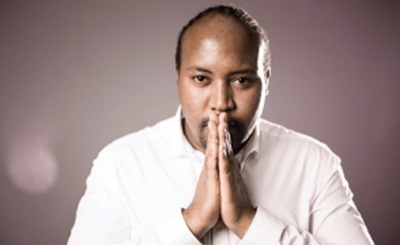Showcasing his versatility, this year’s Standard Bank Young Artist for Music, baritone Njabulo Madladla, presented a recital covering a myriad of vocal genres: spirituals, musical theatre, French Chanson, German Lied – from the early and late Romantic period – and songs from Africa.
This mix of genres and styles appealed to the audience and created space for the pianist, William Vann, to revel in his polished improvisatory style, juxtaposed with superb control and understanding of a repertoire drawn from the canon of Western art music
The state of this piano was unacceptable, and the Festival needs to work at maintaining its reputation by ensuring that concert pianos are properly tuned.
Opening with a brace of spirituals, Madladla set the scene for a fine recital with a spine- tingling rendition of “Deep River”. Clearly identifying with the text, Madladla’s performance facilitated an emotional bond between singer, pianist and audience.
With his voice projecting throughout the Rhodes Chapel, Madladla’s lovingly-presented and musically-intelligible phrasing drew the audience in. This was especially noticeable in “Swing Low, Sweet Chariot” and “The Lord bless you and keep you”.
During a jaunty rendition of “He’s got the whole world in His hands” the audience received its first glimpse of Vann’s affinity with contemporary improvisatory styles.
From the outset of this recital Vann showed his ability to occupy the same artistic space as Madladla through amplifying the singer’s expressive nuances, emotional intensity, artistic imagery, and passionate fervour. Their emotional and artistic union was especially evident in Duparc’s “Chanson Triste”, Schubert’s “Schäffers Klagelied”, Richard Strauss’s “Allerselen”, and Leigh’s “Impossible Dream”. Musical characterization from both artists in Strauss’s “Heimliche Aufforderung” was simply overwhelming. These works represented music-making of the highest order, with Madladla showing complete understanding of each work’s musical style and sonic realm.
Vann’s fervour in underpinning the emotional climax in Duparc’s “La vie Au terrieure” showed his commitment to and understanding of the score; an attitude confirmed during the eloquently performed postlude, where artistic voicing and temporal spacing blended with finely crafted cantabile lines.
The same expansive textural treatment led to the creation of superbly sculptured phrases at the opening of Richard Strauss’s “Allerselen”, though it was in Strauss’s “Morgen” that Vann excelled beyond all expectations. Here, balancing numerous textural strands, Vann’s magnificent carving of a supple melodic line that extended across a wide expanse produced the most keenly felt music-making of the evening.
Vann’s inspired introduction to Rogers and Hammerstein’s “Some enchanted evening” was breathtaking; a testimony to an extraordinarily creative talent.
Here is a pianist with an emerging international reputation, though Festival administrators saw fit to provide an out-of-tune piano for the occasion. “Bending” octaves, particularly noticeable in the piano’s middle register, and shakily tuned unisons – which provided an odd twist to major triads presented in extended arpeggio formation – became increasingly irritating. The state of this piano was unacceptable, and the Festival needs to work at maintaining its reputation by ensuring that concert pianos are properly tuned.
I suspect the piano’s tuning vagaries affected Madladla’s sense of pitch, which occasionally wavered unexpectedly and momentarily in the upper reaches of his range.
Strangely, Duparc’s “La invitation au voyage” received muted harmonic colouring with Vann bizarrely underplaying the principal climax. In this work musical understanding between both artists needs re-evaluation because – notwithstanding Madladla’s understandable communication of artistic imagery and portrayal of the text – his exaggerated crescendos disturbed the flow and interrupted the music’s subtle dynamic shadings.
Madladla enters a new emotional space with ease and immediacy, something that was particularly apparent in the set of Schubert Lieder. With marvellous German diction and controlled vocal delivery, Madladla demonstrated his mastery of this art form. His control over musical tension in the unfolding phrases of Schubert’s “Schäffers Klagelied” and portrayal of dramatic intensity and thematic propulsion in “Rastlose Liebe” placed these interpretations in the highest rank. Similarly, his unadulterated sustained tones in Richard Strauss’s “Allerselen” showcased his remarkable abilities.
Those who missed this concert because Festival administrators programmed it at the same time as the ballet have a chance to hear it this afternoon. One hopes that, before the performance, those in charge will oil the door handle in the Rhodes Chapel so that it doesn’t creak loudly each time a latecomer enters the venue.
Njabulo Madladla in Concert, Rhodes Chapel, today, 3pm
– By Jeffrey Brukman


